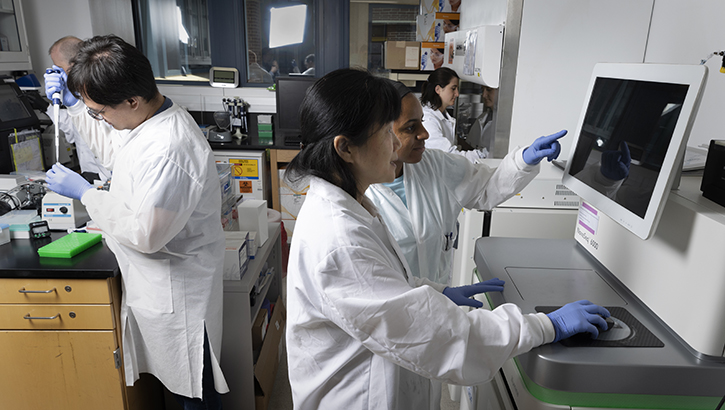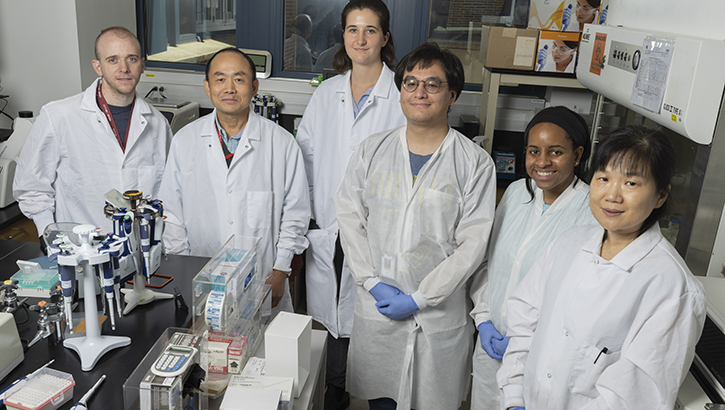Walter Reed Army Institute of Research Implements SARS-CoV-2 Genome Sequencing
 The Walter Reed Army Institute of Research’s Molecular Biology Section processes COVID-19 specimens and collects data. (From left to right: Adam Pollio, Thomas Ryan, Tao Li, Dr. Jennifer Potter-Birriel, and Christine Mariskanish) Credit: Mike Walters, Walter Reed Army Institute of Research
The Walter Reed Army Institute of Research’s Molecular Biology Section processes COVID-19 specimens and collects data. (From left to right: Adam Pollio, Thomas Ryan, Tao Li, Dr. Jennifer Potter-Birriel, and Christine Mariskanish) Credit: Mike Walters, Walter Reed Army Institute of Research
Editor's note: This is the second article in a 7-part series that highlights the work of technicians and scientists in Military Health System laboratories who worked to identify COVID-19 variants using special sequencing technology.
Throughout the last two years, scientists and leaders have worked to identify ways to detect and respond to emerging SARS-CoV-2 variants. The Walter Reed Army Institute of Research'Opens WRAIRs Viral Diseases Branch has played a vital role in these efforts through consistent access to unique samples from various geographic combatant commands. A few of these locations include the U.S. Central Command and U.S. Indo-Pacific Command, as well as multiple recruit and trainee sites within the U.S. Northern Command.
VDB'Ss support for outbreak investigations at these locations has been a valuable asset to the Department of Defense and the Military Health System and provided important force health protectionOpens Health.mil context for controlling SARS-CoV-2 in these DOD high-priority settings.
"The Global Emerging Infections Surveillance and Response System has been a critical partner for the VDB as a sponsor of our SARS-CoV-2 surveillance efforts over the course of the pandemic," said Dr. Matthew Conte, lead of the VDB Viral Genomics and Bioinformatics section. "With their support, we were able to provide near real-time, actionable data that directly informed force health protection measures implemented at DOD installations both at home and abroad."
 The Viral Diseases Branch of Walter Reed Army Institute of Research apply advanced next-generation sequencing technologies and bioinformatics analyses to support genomic surveillance of COVID-19 in Military Health System beneficiaries. (From left to right: Adam Pollio, Dr. Jun Hang, Christine Mariskanish, Thomas Ryan, Dr. Jennifer Potter-Birriel, and Tao Li) Credit: Mike Walters, Walter Reed Army Institute of Research
The Viral Diseases Branch of Walter Reed Army Institute of Research apply advanced next-generation sequencing technologies and bioinformatics analyses to support genomic surveillance of COVID-19 in Military Health System beneficiaries. (From left to right: Adam Pollio, Dr. Jun Hang, Christine Mariskanish, Thomas Ryan, Dr. Jennifer Potter-Birriel, and Tao Li) Credit: Mike Walters, Walter Reed Army Institute of Research
With GEIS support, VDB researchers were also able to develop the Intrahost SARS-CoV-2 K-mer Identification Method, or iSKIM, to rapidly screen genomic datasets and allow early identification of mutations belonging to variants of concern. The iSKIM tool enables the team to quickly prioritize outbreak investigation samples for further downstream analysis. Additionally, iSKIM has been used to scan hundreds of thousands of publicly available raw genomic sequencing datasets to explore the emergence patterns of key SARS-CoV-2 mutations.
"We are proud and excited to be a part of the GEIS'S next-generation sequencing and bioinformatics consortium since its inception in 2017, and we look forward to their continued support of our laboratories in the important endeavor to make genome sequencing an essential part of pandemic preparedness," said Dr. Jun Hang, lead of the VDB Molecular and NGS section